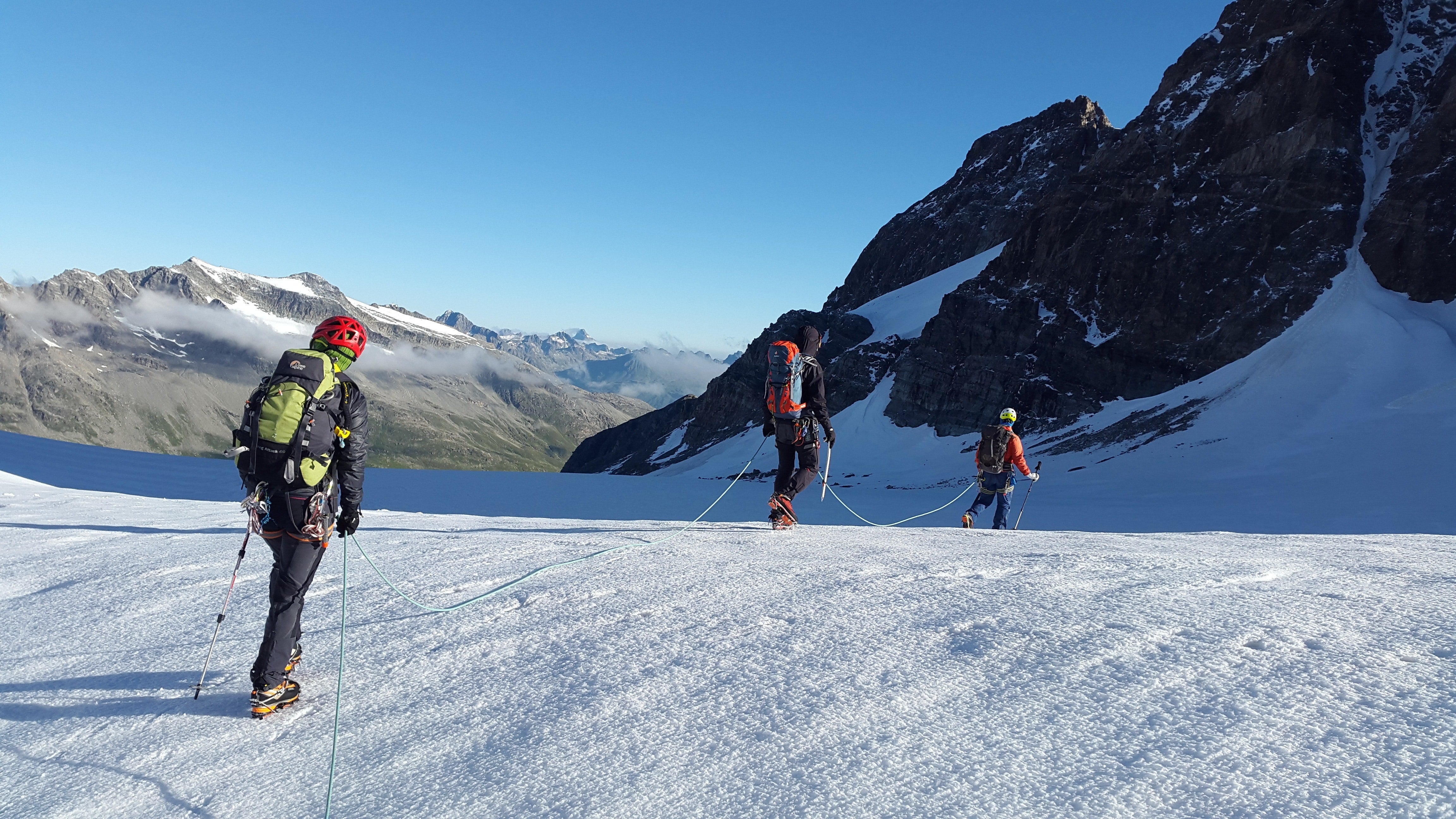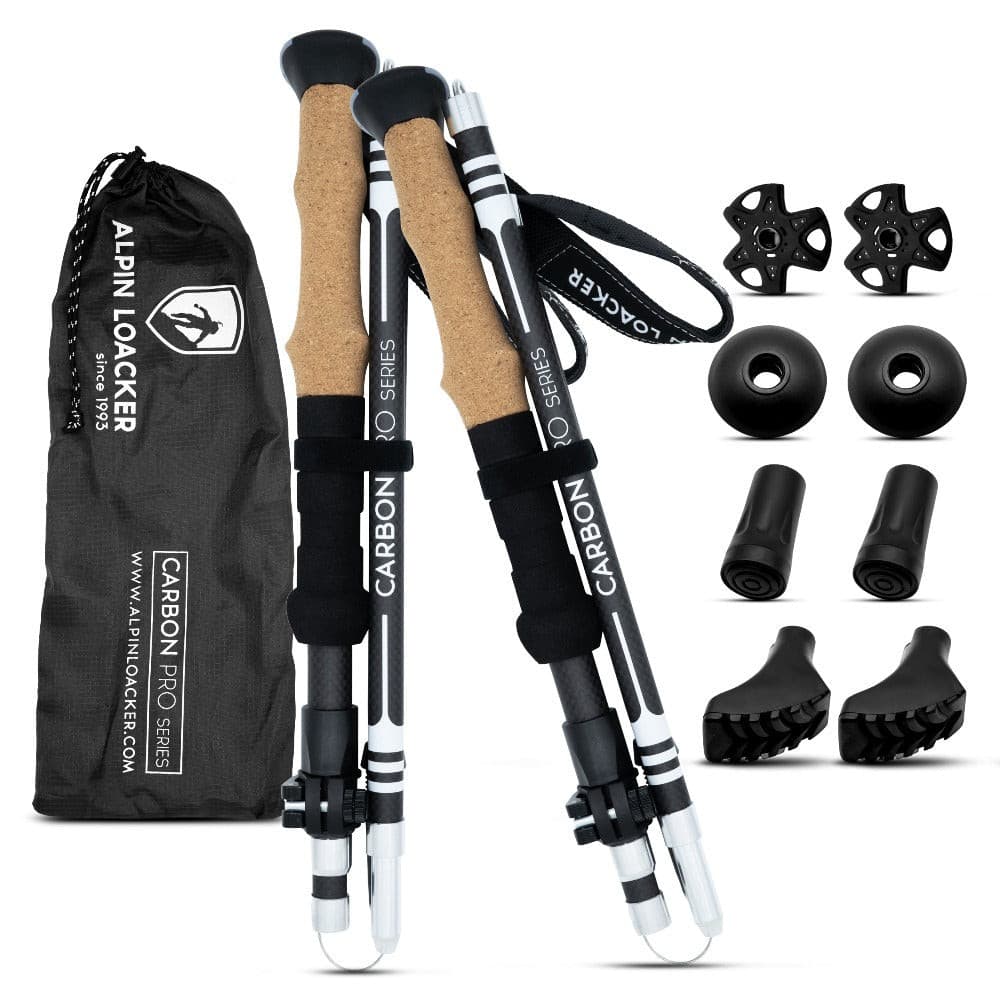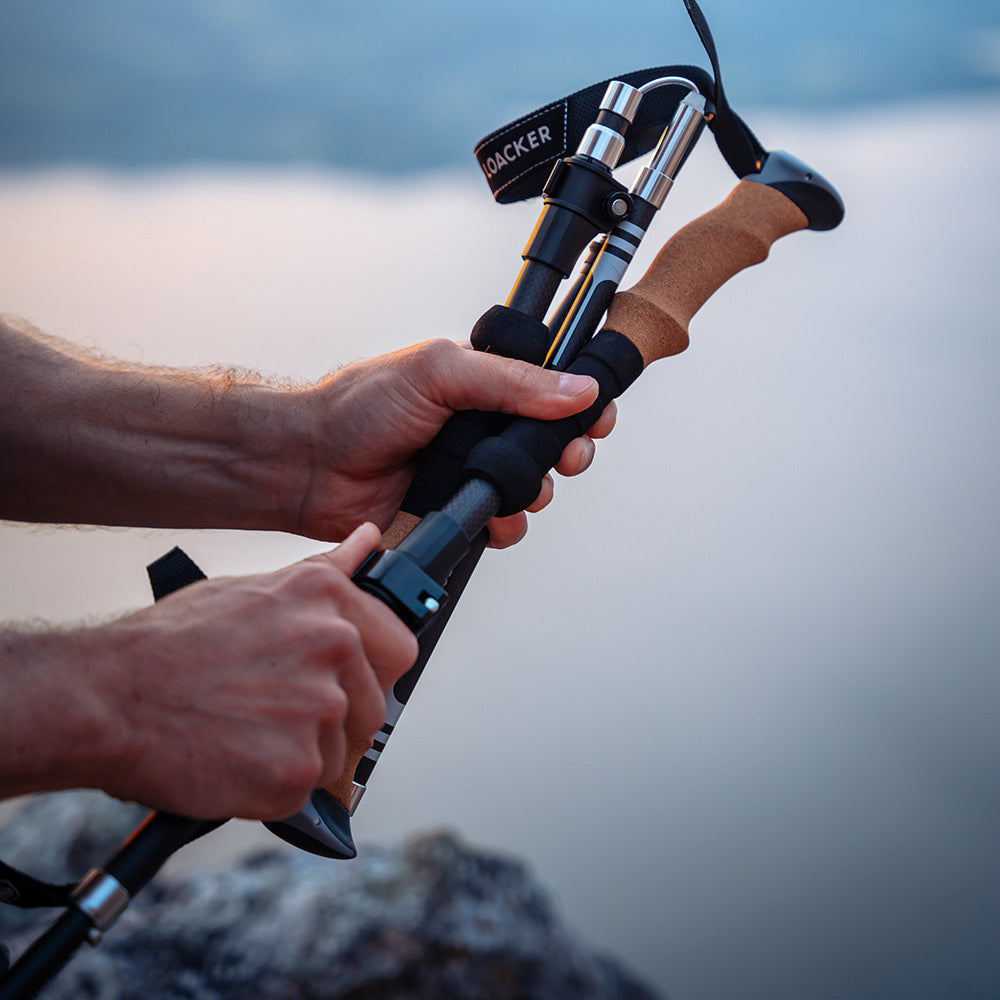Faltstöcke am Rucksack anbringen: Wie wird es richtig gemacht?
Unterschiedliche Befestigungstipps für Trekkingstöcke
Die Stöcke im Rucksack
Mittlerweile bieten unzählige Rucksack Firmen unterschiedlichste Anbringungsmöglichkeiten von Wanderstöcken an. Dies bedeutet aber nicht automatisch, dass außen angebrachte Wanderstöcke der Idealfall sind. Im besten Fall solltest Du deinen Rucksack so planen, dass Du außen keine Ausrüstung anbringen musst. Outdoor Equipment, dass außen befestigt ist, kann erhebliche Nachteile mit sich bringen. "Es ist sicherer Trekkingstöcke im Rucksack aufzubewahren. Zum einen können sie leicht verloren gehen und wenn man stürzt ist die Verletzungsgefahr höher", so Wolfang Loacker - österreichischer Berg- und Skiführer. Zusätzlich ist die Gewichtsverteilung, bei außen angebrachten Wanderstöcken, nur suboptimal. Gewicht zieht nach hinten und nach unten. Zum einen wird das Wandern anstrengender, und bei kniffligen Passagen kannst Du ins Schwanken kommen.
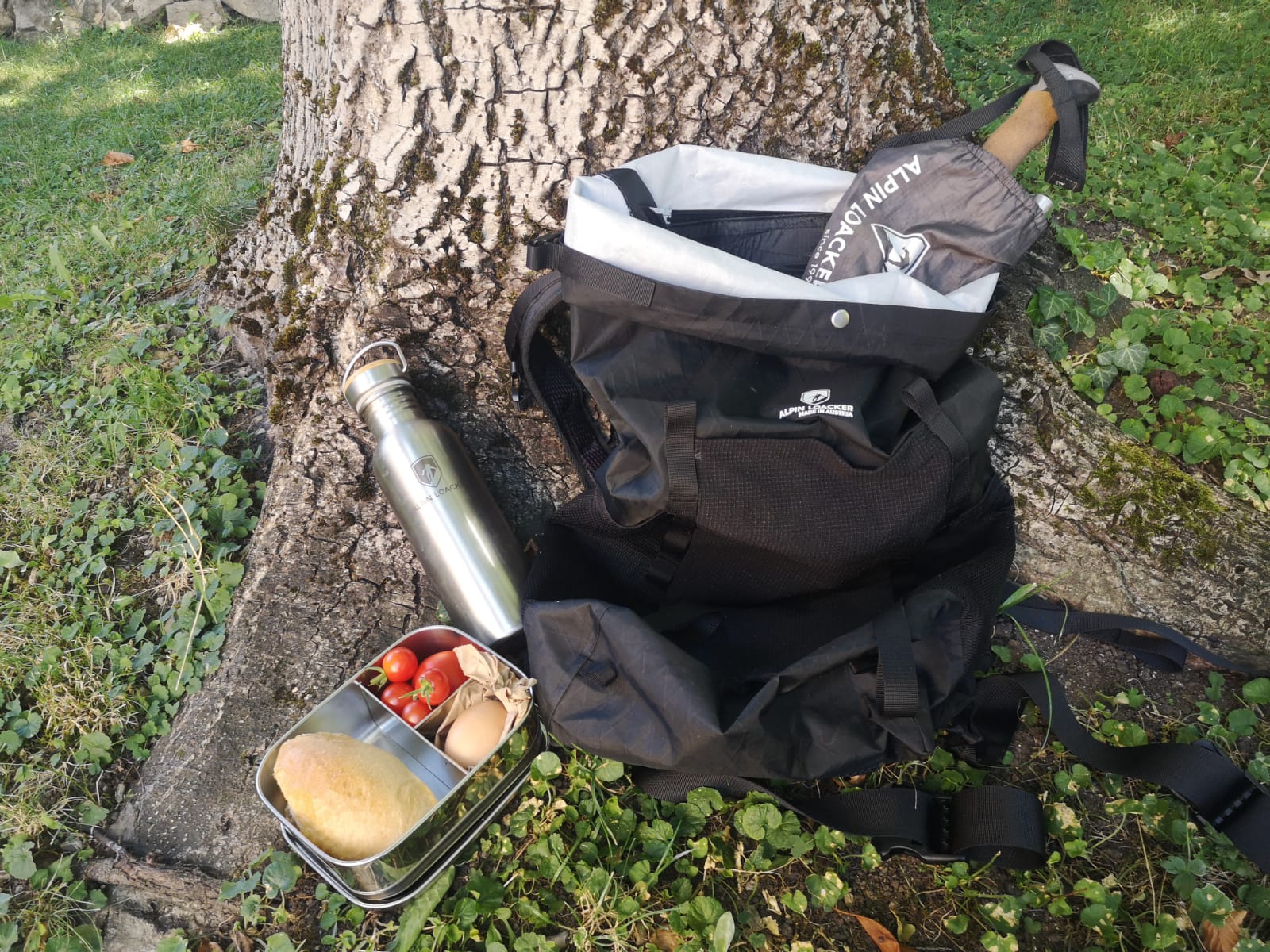
Die Spitze am Rucksack
Die Befestigungsmöglichkeit hängt sehr stark von deinem Rucksack ab. Trekking- und Wanderrucksäcke haben in den meisten Fällen Schlaufen und Hacken die es ermöglichen die Stöcke einzustecken und einzufädeln. Bei Schlaufen wird (die Spitze) unten hineingesteckt. Bei Stöcken ohne Teller findet die kleine Schlaufe Verwendung, bei Stöcken mit Tellern die große Schlaufe. Die Teller verhindern üblicherweise ein Durchrutschen. Ansonsten kannst Du Stockteller auch mit wenigen Handgriffen herunter drehen.
Wichtig: Weite Schlaufen sind nicht unbedingt dafür gedacht Wanderstöcke anzubringen. Vor allem an Ski- und Kletterrucksäcken sind weite Schlaufen dafür gedacht, Eisgeräte und Seile festzumachen.
Kompressionsriemen
Kompressionsriemen sind Schlaufen, meist rechts oder links am Rucksack angebracht, die zugezogen werden können. Die Wanderstöcke werden sozusagen umschlossen und festgezogen. So schlenkern deine Stöcke nicht hin- und her und sitzen fest und sicher an deinem Rucksack.
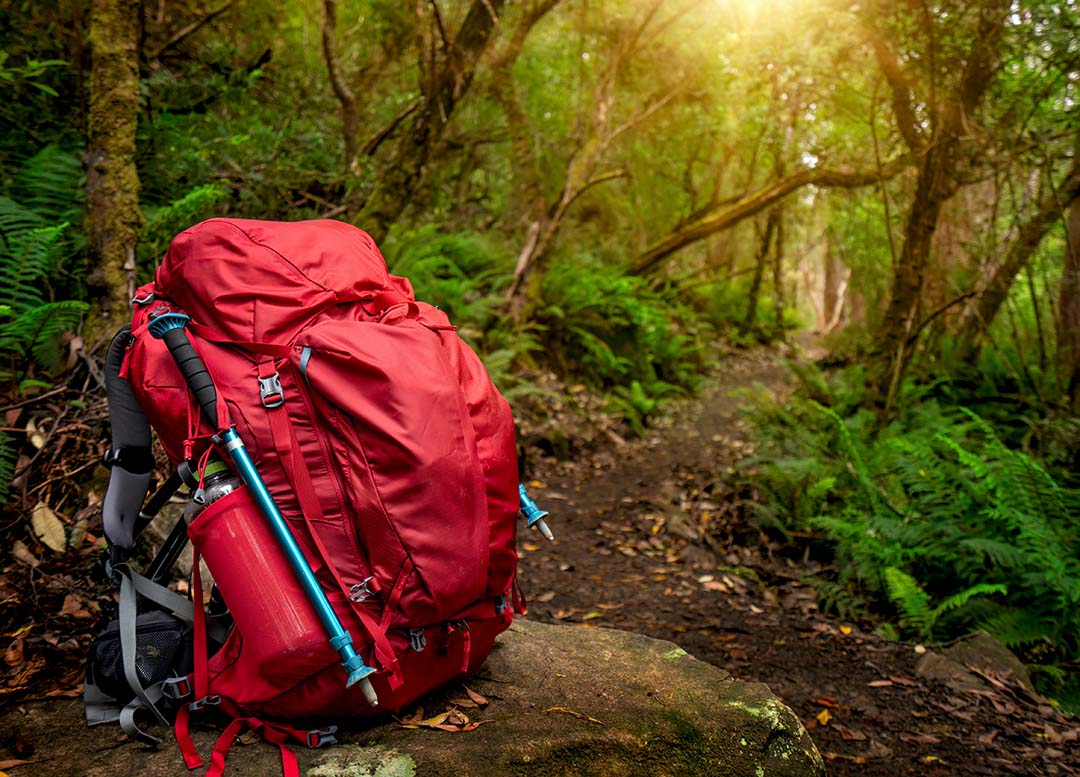
Es gibt unzählige Rucksäcke auf dem Markt. Schlussfolgernd gibt es auch unterschiedliche Befestigungs-möglichkeiten für Trekkingstöcke. Hier ist das Befestigungssystem eine Kordel mit Kordelstopper.
Klett- und Kabelbinder
Eine Alternative sind externe Klettverschlüsse sowie Kabelbinder um Wanderstöcke am Rucksack zu fixieren. Diese Methoden setzen voraus, dass Du am Rucksack schon ein vorhandenes System hast, an denen Du deine externen Klett- oder Kabelbinder einfädeln kannst. Vor allem die Klettverschluss Methode ist nur für den Transport geeignet.
Beispiele für die praktische Anwendung von Kabelbinder an Rucksäcken:
Mit öffentlichen Verkehrsmitteln wie Busse oder Zügen. Wenn Dein Rucksack bspw. auf einem Autodach verstaut wird, hast Du keine direkte Einsicht und kannst im Notfall nicht nachjustieren. Mit fest zugezogenen Kabelbindern halten Deine Trekkingstöcke bombenfest am Rucksack. Gerade auf Backpacking Touren ist man oft mit verschieden Transportmitteln unterwegs. Es kann sinnvoll sein, die Stöcke zusätzlich mit Kabelbindern zu fixieren.
Ähnliche Blog Beiträge
Alles was du über Wanderstöcke wissen solltest
Wanderstöcke sind weitaus mehr als nur ein cooles Equipment. Sie bieten Dir zahlreiche Vorteile und lassen Deine Wanderung zum absoluten Highlight werden. Dennoch gibt es immer noch einige Vorurteile und Irrtümer.
Der folgende Blogbeitrag bringt Licht ins Dunkle. Erfahre:
- Welchen gesundheitlichen Nutzen Wanderstöcke haben
- Wie Du Trekkingstöcke benutzen kannst
- Welche Stöcke am besten zu Dir passen
- Wie Du die Stöcke einstellst
- Welche Transportmöglichkeiten es gibt
- Woran Du gute Wanderstöcke erkennst
Du bist eher der Video-Typ? Kein Problem, in unserer Kaufberatung gehen wir detailliert auf das Thema ein
Video-Beratung Wanderstöcke » So findest Du die richtigen Wanderstöcke
Warum sind Wanderstöcke sinnvoll?
Du hast dich sicherlich schon oft gefragt: “Wann sind Trekkingstöcke überhaupt sinnvoll?“ Weshalb jemand Wanderstöcke benutzt, kann sehr unterschiedliche Gründe haben. Prinzipiell haben Wanderstöcke viele positive Eigenschaften und Vorteile:
1. Unterstützung der Gelenke
Wanderstöcke wirken entlastend für
- Füße,
- Beine,
- Knie
- und Rücken.
Besonders beim Bergabgehen werden die Knie sehr stark belastet. Durch den Einsatz Deiner Bergsteiger Stöcke sparst Du Energie, Deine Konzentration lässt nicht so schnell nach, und Du bist sicherer beim Abstieg.

2. Gleichgewicht
Die meisten Unfälle beim Wandern passieren durch Rutschen oder Stolpern. Wenn Du zusätzlich müde bist, Deine Konzentration nachlässt, ist die Gefahr eines Sturzes noch einmal wesentlich größer.
Die Wanderstöcke sind wie Verlängerungen Deiner Arme, die Dich stützen und Dir einen besseren Halt geben. Du hast dadurch zusätzliche Stabilität und verbesserst deinen Gleichgewichtssinn.
3. Körperhaltung und Atmung
Wanderer, die Trekkingstöcke benutzen, können gleichzeitig ihre Körperhaltung verbessern. Wenn Du einen schweren Outdoor Rucksack auf dem Rücken trägst, unterstützen die Stöcke Deine aufrechte Haltung. Dabei wird deine Wirbelsäule bestmöglich entlastet.
Wanderstöcke provozieren nämlich den Gang in aufrechter Haltung. Es ist fast unmöglich, mit Wanderstöcken nicht aufrecht zu gehen.
- Deine Schultern können vorn nicht ‘zusammenklappen’.
- Zusätzlich wird durch die aufrechte Haltung die Atmung gefördert. Du bekommst leichter Luft.
Expertentipp: Eine bewusste Atmung ist bei Ausdauersport essenziell, damit Du Dich länger konzentrieren kannst, Du nicht so schnell ermüdest und somit unfallfrei bleibst.
4. Sicherheit
Wie du aus den vorigen Punkten herauslesen kannst, helfen Dir die Wanderstöcke in vielerlei Hinsicht. Du bleibst länger unfallfrei, indem Du
- Deine Gelenke unterstützt,
- Dein Gleichgewicht förderst,
- Deine Haltung nicht zusätzlich strapazierst, sondern eine gesunde Körperhaltung förderst.
Generell wirkt diese Gehhilfe positiv auf deinen Energiehaushalt, somit kannst du beim Bergwandern mit Stöcken das Laufen richtig genießen.
5. Nordic Walking
Die schwungvolle Bewegung beim Nordic Walking
- beansprucht Herz und Kreislauf,
- regt den Stoffwechsel an,
- stärkt Muskeln und Knochen
- und rückt überschüssigen Pfunden zu Leibe.
Wer die Bergsteiger Stöcke fleißig vor und zurückschwingt, kräftigt zudem Arme, Schultern und Rücken.

Schritt-für-Schritt-Anleitung: Wanderstöcke richtig einstellen

Schritt 1: Die richtigen Wanderstöcke auswählen
Bevor du die Wanderstöcke einstellst, ist es wichtig, dass Du das richtige Modell für deine Bedürfnisse auswählst. Achte auf die Länge, das Material und die Griffe der Stöcke, um sicherzustellen, dass sie zu Deiner Körpergröße und Deinem Wanderstil passen.

Schritt 2: Die optimale Länge bestimmen
Die Wanderstöcke sollten dem Gelände angepasst werden. Beim Abstieg sollten die Stöcke etwas länger und beim Aufstieg etwas kürzer eingestellt werden. In der Regel aber sollten die Bergsteiger Stöcke so lang eingestellt werden,
- dass die Hand den Griff leicht greifen kann,
- während der Arm im rechten Winkel zum Boden steht.
- Der Unterarm ist parallel zum Boden und am Ellbogen gebeugt.
Welche Wanderstöcke bei welcher Körpergröße?
Viele Unternehmen bieten Richtlinien für die richtige Länge für die Körpergröße an. Es kann jedoch sehr individuell sein, wie ein Stock eingestellt wird. Wichtig ist, wie oben beschrieben, dass die Grundeinstellung in einem rechten Winkel erfolgt.
Wie lang sollten Nordic Walking Stöcke sein?
Da diese Frage oft speziell auch für Nordic Walking Stöcke auftaucht, behandeln wir diese Frage hier gesondert.
- Der Abstand zwischen Stock und Körper sollte circa eine halbe Armlänge betragen.
- Wenn Dein Arm in einem 90 Grad Winkel gebeugt ist, sollten die Stöcke an Deinen Unterarmen enden.
- Das 90 Grad Prinzip ist also genau gleich wie bei herkömmlichen “Trekkingstöcken”.
- Zusätzlich gibt es die Methode für die Berechnung der Länge. Dafür multiplizierst Du Deine Körpergröße in Zentimeter mit 0,7. Das Ergebnis ist die Stocklänge.

Schritt 3: Wanderstöcke Höhe einstellen
Suche nach dem Verstellmechanismus an deinen Wanderstöcken. Dies kann ein Drehverschluss, ein Klappsystem oder ein Schnappverschluss sein. Löse den Verschluss, um die Stöcke zu verstellen. Ziehe oder schiebe die Teleskopstangen, um die gewünschte Höhe einzustellen. Achte darauf, dass die Markierungen an den Teilen übereinstimmen, um sicherzustellen, dass beide Stöcke gleich hoch eingestellt sind.

Schritt 4: Die Handschlaufen einstellen
Wanderstöcke sind normalerweise mit Handschlaufen ausgestattet, die es dir ermöglichen, die Stöcke ohne festes Greifen zu halten. Schlüpfe mit Deiner Hand durch die Schlaufe und passe die Größe der Schlaufe so an, dass sie bequem sitzt. Du solltest die Schlaufe so einstellen, dass du leicht in sie hinein- und herausrutschen kannst, ohne dass sie zu locker oder zu eng sitzt.

Schritt 5: Die Spitzen überprüfen
Überprüfe die Spitzen deiner Wanderstöcke, um sicherzustellen, dass sie intakt und scharf genug sind, um guten Halt auf verschiedenen Oberflächen zu bieten. Bei Bedarf kannst Du die Spitzen austauschen oder abgenutzte Spitzen ersetzen.

Schritt 6: Testlauf und Feinjustierung
Bevor Du mit den eingestellten Wanderstöcken auf eine längere Wanderung gehst, mache einen kurzen Testlauf. Gehe ein paar Schritte und überprüfe, ob die Länge und die Einstellungen bequem sind und sich gut anfühlen. Passe die Einstellungen bei Bedarf an, um das optimale Wandererlebnis zu erreichen.
Wie geht man richtig mit Wanderstöcken?
Beim Wandern laufen wir oftmals einfach los, ohne uns Gedanken über unsere Gehtechnik zu machen. Dies ist auch nicht verwunderlich. Schließlich ist unser Laufen automatisiert.
Wenn Du jedoch das volle Potenzial Deiner Trekkingstöcke nutzen möchtest, solltest Du beim Einsatz einige Punkte beachten:
1. Größe richtig einstellen
Zuallererst stellst Du Deine Wanderstöcke auf die richtige Größe ein. Siehe Punkt unsere Schritt-für Schritt Anleitung .
2. Griff richtig halten
Ein häufiger Fehler ist der falsche Griff, bei dem die Schlaufe oft einfach von oben eingefädelt wird. Richtigerweise solltest Du von unten durch die Schlaufe greifen, sodass man selbst mit geöffneter bzw. lockerer Hand Druck auf den Stock ausüben kann.
Dadurch kann man die Hände bei der Ausholbewegung öffnen, ohne auf die Entlastung zu verzichten.
Expertentipp: Damit die Hände nicht verkrampfen, solltest du bei der Ausholbewegung darauf achten, den Griff locker zu lassen.
Wichtig: Die Schlaufe sollte nur im relativen flachen Gelände benutzt werden. Wer stürzt und eingefädelt ist, kann nicht nach dem Griff greifen oder sich abstützen. Die Verletzungsgefahr ist dadurch um einiges höher.
3. Die richtige Körperhaltung
Um den bestmöglichen Effekt zu erzielen, ist es ratsam, die Stöcke immer nah am Körper zu führen. In flachem Gelände sind die Stöcke diagonal zu den Beinen und werden abwechselnd eingesetzt, entsprechend dem natürlichen Bewegungsmuster.
4. Im steilen Gelände gehen
In steilem Gelände ist der Doppelstockeinsatz die Variante, die Du anwenden solltest. Die Stöcke werden beim Auf- und Abstieg in der Regel bei jedem zweiten Schritt gesetzt und Du drückst Dich kraftvoll mit beiden Armen nach oben. So sind Stabilität und Entlastung gewährleistet.
5. Bergab gehen
Auch beim Bergabgehen ist die Doppelstocktechnik die beste Wahl. Du solltest die Stockspitzen nicht ins Gelände bohren, sondern den Griff so greifen bzw. halten, dass Du eine saubere Technik ausführen kannst. So rutschst Du nicht weg und vermeidest Stürze.
6. Querungen
Bei Querungen müssen Stöcke nicht zwingend anders eingestellt werden. Es reicht, wenn Du den bergseitigen Stock unterhalb des Griffes festhältst und talseits den Griff wie ein Knauf von oben umfasst.
7. Sehr steiles Gelände und Traversen
Sehr steiles Gelände und Traversen solltest Du uneingeschlauft passieren. Der Stock sollte hier ‘nur’ als Stütze verwendet werden. Es gibt auch die Möglichkeit, einen Stock mit beiden Händen zu umfassen.
"Das ist eine alte Methode, wie es die Bergsteiger damals gemacht haben. So Wolfgang Loacker, erfahrener Berg- und Skiführer im Montafon."
Steiles Gelände solltest Du aber prinzipiell nur begehen, wenn Du fit genug bist und Erfahrung hast, bzw. eine*n Expertin/Experten dabei hast.
Faltstöcke am Rucksack anbringen
Auf manchen Etappen oder in Bus und Bahn benötigst Du Deine Wanderstöcke nicht. Faltstöcke haben hier einen entscheidenden Vorteil.
Sie sind im Handumdrehen zusammengefaltet und aufgrund ihres geringen Packmaßes und Gewichtes ultraleicht zu transportieren. Das solltest du über den Transport deiner Wanderstöcke wissen:
Die Stöcke im Rucksack
Im besten Fall solltest Du außen am Rucksack keine Ausrüstung anbringen.
„Es ist sicherer, Trekkingstöcke im Rucksack aufzubewahren. Zum einen können sie leicht verloren gehen und wenn man stürzt, ist die Verletzungsgefahr höher", so Wolfgang Loacker, – österreichischer Berg- und Skiführer.
Außerdem wird das Bergwandern mit Stöcken, die am Wander Rucksack befestigt sind, schwieriger und gefährlich. Das Gewicht zieht nämlich nach hinten und nach unten. Das belastet deine Wirbelsäule und kostet Kraft.
Die Spitze am Rucksack
Die Befestigungsmöglichkeit hängt sehr stark von deinem Rucksack ab. Trekking- und Wanderrucksäcke haben in den meisten Fällen Schlaufen und Hacken, die es ermöglichen, die Stöcke einzustecken und einzufädeln.
Bei Schlaufen wird (die Spitze) unten hineingesteckt. Bei Stöcken ohne Teller findet die kleine Schlaufe Verwendung, bei Stöcken mit Tellern die große Schlaufe.
Die Teller verhindern üblicherweise ein Durchrutschen der Stockspitzen. Ansonsten kannst Du Stockteller auch mit wenigen Handgriffen herunterdrehen.
Kompressionsriemen
Kompressionsriemen sind Schlaufen größtenteils rechts oder links am Rucksack angebracht, die zugezogen werden können. Die Wanderstöcke werden sozusagen umschlossen und festgezogen. So schlenkern deine Stöcke nicht hin- und her und sitzen fest und sicher an deinem Rucksack.
Klett- und Kabelbinder
Eine Alternative sind externe Klettverschlüsse sowie Kabelbinder, um Wanderstöcke am Rucksack zu fixieren. Diese Methoden setzen voraus, dass Du am Rucksack schon ein vorhandenes System hast, an denen Du Deine externen Klett- oder Kabelbinder einfädeln kannst. Vor allem die Klettverschluss-Methode ist nur für den Transport geeignet.
Wie transportiere ich Wanderstöcke im Flugzeug?
Wander- oder Trekkingstöcke sind im Handgepäck nicht erlaubt. Das gilt auch für Teleskop Wanderstöcke, die sich zusammenschieben lassen. Grund hierfür ist, dass Wander- oder Trekkingstöcke an der Sicherheitskontrolle zu den gefährlichen Gegenständen gezählt werden, weil sie sich potenziell auch als Waffen verwenden lassen.
Wanderstöcke können nur im Aufgabegepäck mitgenommen werden. Klappbare- oder Teleskop-Wanderstöcke sind hier von Vorteil. Diese können einfach er im Koffer oder Rucksack verstaut werden. Es muss keine zusätzliche Gebühr bezahlt werden und der Koffer kann platzsparend gepackt werden.
Bei nicht faltbaren Stöcken muss eine zusätzliche Gebühr gezahlt werden, da es sich um Sperrgepäck handelt und diese Art von Stöcken nicht in den Koffer passt. Die einzige Ausnahme beim Handgepäck bilden Gehhilfen wie Krücken oder Gehstöcke, wenn diese aus einem medizinischen Grund notwendig sind.
Welche Spitze für welchen Untergrund?
Auf Deiner Tour wirst Du oftmals mit unterschiedlichen Untergründen konfrontiert. Deshalb sind im Lieferumfang unserer Wanderstöcke auch verschiedene Aufsätze enthalten.
- Für den Einsatz auf hartem Untergrund eignen sich vor allem Asphalt Aufsätze. Sie schützen die Metallspitze am Wanderstock vor unnötigem Abrieb.
- Für den Einsatz im Gebirge solltest Du Deine Stöcke ohne zusätzlichen Aufsatz verwenden.
- Es sei denn, Du wanderst über Geröll. Hier empfiehlt sich das Aufschrauben der Schlamm-Aufsätze. Sie verhindern ein Einsinken. Wie der Name schon vermuten lässt, kannst Du diese auch im Matsch, auf Erde und Sand einsetzen.
Die mitgelieferten Nordic-Walking Aufsätze erleichtern Dir das schnelle Gehen und Pushen Deine Geschwindigkeit.
Kann ich mit Wanderstöcken auch auf Schnee und Eis wandern?
Ja! Dank der mitgelieferten Schneeteller kannst du deine Wanderstöcke auch im Winter nutzen. Die Aufsätze sind optimal für den Einsatz auf Schnee geeignet. Wenn Du eisbedeckte Passagen überqueren möchtest, solltest Du die Spitze ganz ohne Aufsatz verwenden. So hast Du maximalen Halt.
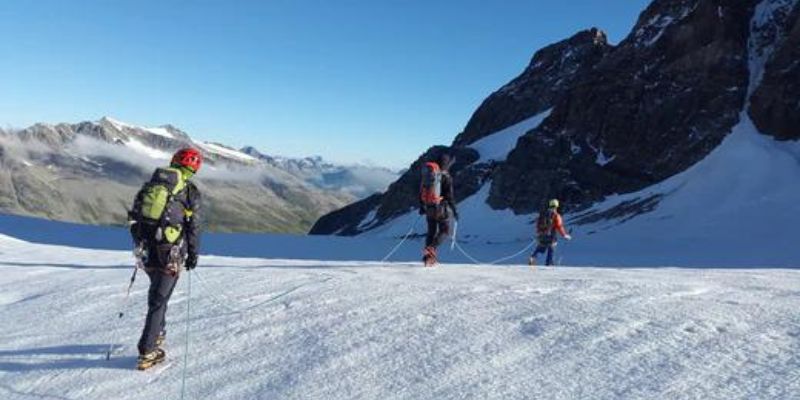
Fazit: Was sind gute Wanderstöcke?
Die eigenen Bedürfnisse stehen an erster Stelle. Dies ist der erste Anhaltspunkt, wie Du Deine Stöcke auswählen solltest, damit es ein „guter“ Stock für Dich wird. Körpergröße und Körpergewicht helfen Dir in diesem Punkt weiter. Bei guten Wanderstöcken sollte an zweiter Stelle immer das Preis-Leistungs-Verhältnis passen. Vergleichen und Erfahrungsberichte helfen hier weiter.
Wenn Du Dir nicht sicher bist, für welche Gelegenheiten Du die Stöcke überhaupt verwendest, ist es ratsam, nicht zu spezifisch einzukaufen. Sondern ein paar Stöcke, dass für mehrere Einsatzbereiche verwendet werden kann, zu erwerben.
Ansonsten gilt es, Stöcke nach dem Einsatzzweck auszuwählen. Wenn Du die Stöcke hauptsächlich für entspannte Wanderungen im Flachland benötigst, dürften Aluminium-Teleskopstöcke völlig reichen.
Möchtest Du allerdings auch Mehrtagestouren oder ins Gebirge, dann sind faltbare Aluminium- oder Carbonstöcke zu empfehlen. Es gibt keine eindeutige Antwort, was einen guten Wanderstock ausmacht und was nicht.
Bei falschem Einsatz und falscher Handhabung nützt Dir der teuerste und leichteste Carbonstock nichts mehr. Viel wichtiger ist es, sich mit dem Material auseinanderzusetzen und die eigenen Bedürfnisse zu kennen, um einen passenden Stock auszuwählen.
FAQ zum Thema Wanderstöcke:
Sollte ich feste oder teleskopierbare Wanderstöcke wählen?
Pauschal lässt sich diese Frage natürlich nicht beantworten. Der Einsatz der verschiedenen Modelle ist einerseits Geschmacksache. Andererseits hängt die Verwendung auch vom Einsatzgebiet ab. Wenn Du Wert auf ein geringes Gewicht und kleines Packmaß legst, solltest Du teleskopierbare Wanderstöcke auswählen.
Diese sind im Handumdrehen eingestellt und einsatzbereit. Legst Du hingegen Wert auf Steifigkeit und verlangst den Stöcken so einiges ab, dann sind feste Wanderstöcke besser geeignet.
Meine Wanderstöcke lassen sich nicht mehr feststellen: Was kann ich tun?
Wenn deine Wanderstöcke sich nicht mehr feststellen lassen, gibt es einige mögliche Lösungen, die du ausprobieren kannst:
Überprüfe die Verschlüsse: Stelle sicher, dass die Verschlüsse oder Klemmen der Wanderstöcke richtig geschlossen sind. Manchmal können sie sich versehentlich lösen oder nicht richtig arretieren.
Reinige die Stöcke: Schmutz, Sand oder Feuchtigkeit können die Mechanismen der Wanderstöcke beeinträchtigen. Reinige die Stöcke gründlich, um sicherzustellen, dass sie einwandfrei funktionieren.
Fette die Verschlüsse: Falls die Verschlüsse festgeklemmt sind oder sich schwer bewegen lassen, kannst du etwas Schmiermittel oder Silikonspray auf die Mechanismen auftragen, um sie wieder leichtgängig zu machen.
Wie reinige ich meine Wanderstöcke?
Bei sachgerechter Behandlung und der richtigen Pflege sind Wanderstöcke viele Jahre ein zuverlässiger Begleiter. Wenn Deine Wanderstöcke nass geworden sind, solltest Du sie auf die komplette Länge einstellen und mit einem sauberen Tuch abwischen. Dies gilt übrigens auch, wenn Deine Stöcke mit Dreck oder Staub in Berührung gekommen sind.
Vermeide dabei unbedingt, dass Schmutz in die einzelnen Segmente gelangt, da dies die Funktion beeinträchtigen kann. Solltest du deinen Wanderstöcken eine längere Pause gönnen, lagere sie unbedingt an einem trockenen und sauberen Ort. Ein feuchter Keller oder die Garage sind eher nicht geeignet.




